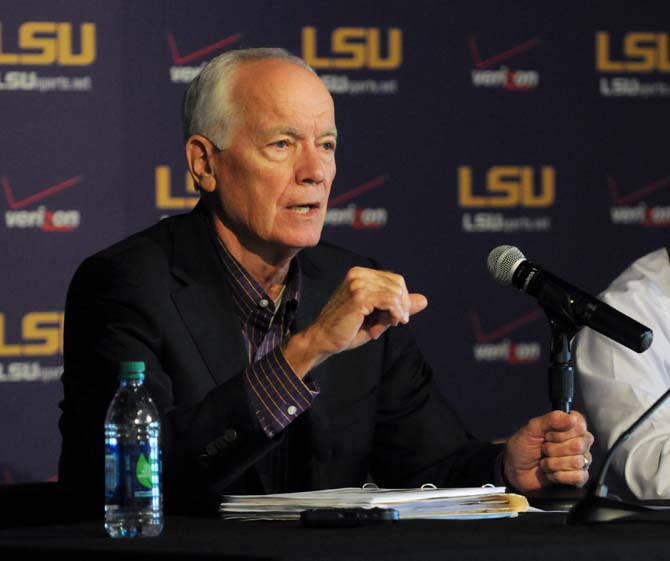More people walked through the turnstiles at University athletic events in 2012 than live in the seven-parish New Orleans metropolitan area, said Loren Scott, president and economist at Loren C. Scott and Associates, at a press event Thursday.
Scott presented a completed study of the economic effect of LSU Athletics on the state and Baton Rouge, after being commissioned by LSU Athletics. It showed that over a typical seven home game football season, out-of-state visitors spend more than $30 million in the Louisiana, with more than $20 million spent in the Baton Rouge area alone.
The last economic study done on LSU Athletics’ effect on the economy was in 2001. Scott said over the years, differences as large as $5 million can be seen in the amount of money brought in for a winning football season, in comparison to a losing football season.
Construction on different athletic buildings, including the expansion of the South Endzone in Tiger Stadium, spent about $14 million in local jobs and businesses, resulting in more than $20 million in state revenues over a 14 year period, Scott said.
Scott said for critics of LSU head football coach Les Miles’ annual salary, the additional money brought in for a season with more wins than losses more than justifies the expense.
A typical night in Tiger Stadium had as many people sitting in the stands as people who live in Lafourche Parish, the study found, and 2,765 people work at a game day. Scott said he was most surprised to learn the number of jobs in the stadium during football season, saying he first believed it would only be around 500 workers.
During one football game, 48,800 soft drinks and more than 14,000 hot dogs were sold at the concession stands within Tiger Stadium. Scott said civic groups, like Boy Scouts of America and various church groups that sell food at the stadium stands, took in a percentage of the total $815,000 revenues in 2012.
Joe Alleva, University athletic director, said the study shows how LSU Athletics contributes to the local economy by bringing in businesses that cater to spectators and students.
Scott said it was important when analyzing how the sporting events affect the economy to evaluate whether certain funds would still be spent within the state, were it not for the athletic events. He said the University’s athletics bring in about $8 million in state tax revenues.
Scott said it’s important for students to understand LSU Athletics is completely self-supporting, unlike other institutions, and it does not take any funding from academic programs at the University.
LSU Athletics employs a total of 3,948 people, resulting in more household earnings than all food and beverage stores in East Baton Rouge Parish, and $2.8 million in local government sales taxes, the study found.
Study shows the effect of LSU Athletics on the state, Baton Rouge
April 10, 2014
Loren C. Scott, president and founder of Loren C. Scott & Associates, discusses the effect of sports on the Baton Rouge community Thursday, April 10, 2014 at the Athletic Administration Building.





